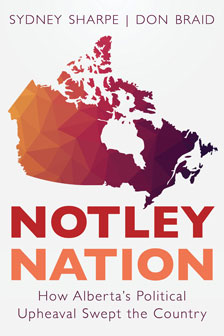
Dundurn Press 2016/$19.99/264 pp.
It remains a pleasant shock that Alberta is no longer a political monolith. Why Rachel Notley’s NDP triumphed and how well they are governing have occasioned considerable debate since the election in May 2015. In Notley Nation, journalists Sydney Sharpe and Don Braid—the latter a long-time columnist for the Calgary Herald—focus on the NDP leader’s role, and search for middle ground between government supporters and embittered conservatives who think it unnatural for social democrats to govern Alberta.
While providing an overview of Alberta’s recent electoral history, the authors make a persuasive case for an unspoken alliance between the province’s NDP government and its federal Liberal counterpart. In 2015 both Justin Trudeau and Notley needed a formula to blend twin commitments to economic growth and the battle against climate change: Alberta’s Climate Leadership Plan became a prerequisite for federal approval of pipelines. While Notley is more left-wing on labour and poverty issues, both governments are incurring debt to build infrastructure, emphasizing equality of women and men and seeking improved relations with Aboriginal peoples. The authors might have added that as a Liberal MLA, Calgary’s Kent Hehr lobbied unsuccessfully to merge the provincial NDP and Liberals, arguing that after Notley would speak in the legislature, he often felt like saying, “What she said.”
Too much is unexplored here. Sharpe and Braid uncritically accept NDP campaign manager Brian Topp’s claims about how the party’s organization swelled during the campaign. It did grow, but functioning constituency associations were few and the party lacked funds to run campaigns in many seats they ended up winning. The “Notley wave” carried some candidates into the legislature who barely campaigned.
The authors display only rudimentary knowledge of Alberta’s political history before PC rule. More surprisingly, their treatment of the PC era is sometimes sloppy. They ignore that progressive parties enjoyed about 40 per cent of the popular vote in the 2004 and 2008 provincial elections, making the 2015 election mainly remarkable for Notley’s mop-up of almost all centre-left strategic votes. While they recognize that the National Energy Plan spat between Ottawa and Edmonton was over revenue-sharing, the authors recite the mythology that the NEP “carpet of doom,” as opposed to tumbling oil prices, provoked Alberta’s 1982–83 recession.
A focus on public opinion over policy analysis is also evident in discussion of Notley government policies, with the exception of gender issues, where the authors shine. Regarding Bill 6, the Enhanced Protection for Farm and Ranch Workers Act, there is a single-minded emphasis on amateurish government communications. The authors extol the fiction of a united farming community rising up against urban power brokers. Both the academic literature and discussions with farm labourers would nuance that trope.
The authors claim that even “lifelong New Democrats” feel their government has “done too much too quickly.” The comment reflects the superficiality of the book. Many New Democrats believe the government has moved slowly on promises such as a ceiling for daycare costs or the addition of public, long-term care beds. Others want more action on the development of renewables. Most New Democrats blame the media, who employ Sharpe and Braid, along with corporate-sponsored “institutes” for the government’s challenges in explaining its agenda. Nonetheless, Notley Nation is a reasonable first attempt to analyze regime change in Alberta.
–Alvin Finkel is a Canadian historian, president of the Alberta Labour History Institute and a blogger at Change Alberta/Facebook.

